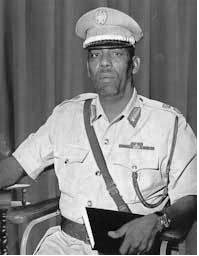By Adan Makina
Editor’s note: Oct 21 marks the 47th anniversary of the Coup D’état of 1969 that brought to power General Siad Barre ending the multiparty-based constitutional Democracy in Somalia. WardheerNews is republishing this piece on the occasion. Adan Makina takes us back to the events that took place during the authoritarian rule of the late Siad Barre and the ensuing collapse of the Somali state.
_______________
Introduction
This paper discusses the ethical and social justice issues that afflicted the Somali nation from 1969 to 1991 when the Supreme Revolutionary Council (SRC) acted as the only political entity in the country. Two major aspects, ethics and social justice, that had been immensely undermined and abused by the state, plunged the Somali nation into its current state of statelessness. Ethics and social justice are two interrelated subjects that have been used interchangeably in legal matters and in social organization. At that time, Somalia, a country in the Horn Africa bordering Kenya, Ethiopia, Djibouti, the Red Sea and the Indian Ocean, was ruled by a military regime that was headed by Major General Mohamed Siyad Barre. During SRC’s height of power, the concepts of human rights, equality, justice, and liberty got trampled on by the revolutionary party thus affecting the lives of a homogeneous nation dominated primarily by peripatetic citizens whose livelihood depended on livestock raring.

Proclaiming independence and a pseudo-democracy in 1960, the first of its kind in Africa, after the merger of the northern British Somaliland protectorate and the southern Italian colony of Somaliland, Somalia’s political freedom worsened after a military takeover in 1969. Nine years into democratic rule, the political landscape tilted toward military rule with the sudden assassination of President Abdirashid Ali Shermarke. The subsequent coup d’état orchestrated by a junta comprising twenty-five military officers led to the dissolution of previous democratic and parliamentary institutions. The demise of democratization and the rise of militarism gave birth to socio-political injustices that included tribal hegemony, political irredentism, nationalization of private institutions, excessive corrupt practices, abuse of office, favoritisms and persecution of the clergy and political opponents.
Sensing a power vacuum after the sudden departure of the assassinated president from the political spectrum, members of SRC resolved to massive sweeping operations that resulted in human rights violations. President Shermarke was gunned down by a close relative on October 15, 1969 while on a trip to the north of the country at Las Anod Airstrip (Mertz, 1992).
Despite the SRC spearheading massive militarization and improvement of state economic structures on a grand scale in its initial years of governance, the sudden turn of political events in the country accelerated the collapse of state institutions, consequently spearheading the disintegration of social equality and decline of economic freedom. Unethical running of state institutions by corrupt military cadres primarily from the SRC and their immediate relatives who espoused militaristic and authoritarian leadership styles opened a path for an atmosphere of disobedience, distrust, and recalcitrance. The absence of obligation to the citizenry (Cooper, 2006) brought about conflicting loyalties or conflicting obligations remorselessly revolving into a state of virulence. In this case, the SRC was to blame for the justification of state tyranny and propagation of rampant corruption committed in its name by the state machinery.
Read more:Somali Supreme Revolutionary Council
Adan Makina
WardheerNews
Email:[email protected]
We welcome the submission of all articles for possible publication on WardheerNews.com. WardheerNews will only consider articles sent exclusively. Please email your article today . Opinions expressed in this article are those of the author and do not necessarily reflect the views of WardheerNews.
WardheerNew’s tolerance platform is engaging with diversity of opinion, political ideology and self-expression. Tolerance is a necessary ingredient for creativity and civility.Tolerance fuels tenacity and audacity.
WardheerNews waxay tixgelin gaara siinaysaa maqaaladaha sida gaarka ah loogu soo diro ee aan lagu daabicin goobo kale. Maqaalkani wuxuu ka turjumayaa aragtida Qoraaga loomana fasiran karo tan WardheerNews.
Copyright © 2024 WardheerNews, All rights reserved


